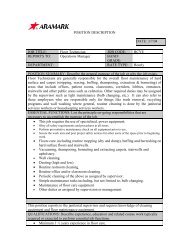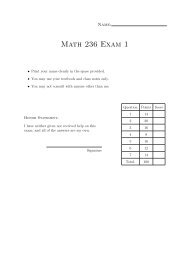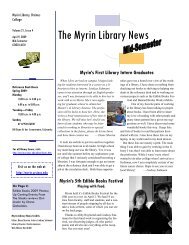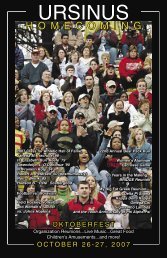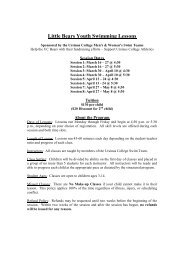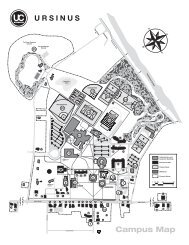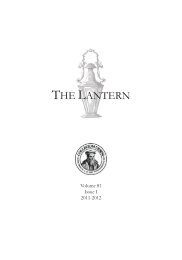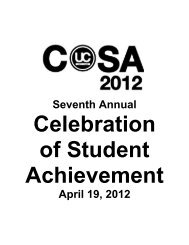Anthropology and Sociology - Ursinus College
Anthropology and Sociology - Ursinus College
Anthropology and Sociology - Ursinus College
You also want an ePaper? Increase the reach of your titles
YUMPU automatically turns print PDFs into web optimized ePapers that Google loves.
ursinus college catalogue<br />
ANTH-242. Peoples of Africa Dr. Oboler, Prof. Bowles<br />
The African continent south of the Sahara is a complex array of cultures. This course will introduce students<br />
to sub-Saharan Africa by emphasizing both the tremendous diversity of African cultures <strong>and</strong> the unifying<br />
themes that distinguish Africa as a cultural area. Topics include the history of human settlement <strong>and</strong><br />
population migrations; social, political, <strong>and</strong> economic organization; traditional <strong>and</strong> contemporary religion<br />
<strong>and</strong> belief systems; the impact of European colonization; <strong>and</strong> contemporary social change. The special case<br />
of South Africa receives special attention at the end. Prerequisite: any 100-level course in <strong>Anthropology</strong><br />
or <strong>Sociology</strong> or permission of the instructor. Three hours per week. Four semester hours. (SS, G.)<br />
ANTH-251. Intermediate Topics in <strong>Anthropology</strong> Faculty<br />
An occasional course which will focus on special topics in anthropology. This course is offered as needed.<br />
Any 100-level course in <strong>Anthropology</strong> or <strong>Sociology</strong>, or permission of instructor. Three hours per week.<br />
Four semester hours. (SS, G.)<br />
ANTH-351. Advanced Topics in <strong>Anthropology</strong> Faculty<br />
An occasional course which will focus on special topics in anthropology. This course is offered as needed.<br />
Prerequisite: Any 100-level course in <strong>Anthropology</strong> or <strong>Sociology</strong> or permission of the instructor. Three hours<br />
per week. Four semester hours. (SS).<br />
ANTH/ENV-352. Peoples <strong>and</strong> Their Environments Dr. Oboler<br />
Human cultural patterns <strong>and</strong> social institutions are adaptations to particular physical <strong>and</strong> social environments<br />
<strong>and</strong> also have impacts on those environments. This course is concerned with the relationship between<br />
environments <strong>and</strong> subsistence systems on the one h<strong>and</strong>, <strong>and</strong> social/political institutions <strong>and</strong> belief systems<br />
on the other, using case studies from a variety of traditional societies. We will also consider the relationship<br />
between the global ecosystem <strong>and</strong> problems of Third World development, patterns of peasant production,<br />
causes <strong>and</strong> consequences of rapid population growth, <strong>and</strong> the fate of indigenous peoples. Prerequisite: any<br />
100-level course in <strong>Anthropology</strong> or <strong>Sociology</strong> or permission of the instructor. Three hours per week.<br />
Four semester hours. (SS, G.)<br />
ANTH-371. Readings in <strong>Anthropology</strong> I Faculty<br />
Readings in anthropology is a directed reading course in which a student can further develop an interest he or<br />
she began in a course, or can explore an interest in the field for which we do not provide a course. In order to<br />
register for readings, a student must have a clear goal, must present a bibliography to the department member<br />
who will be supervising the readings course, <strong>and</strong> the work will be demonstrated. Prerequisites: A student must<br />
be a major in anthropology <strong>and</strong> sociology, <strong>and</strong> have completed at least four courses toward the major. Six to<br />
eight hours of reading per week. Two semester hours.<br />
ANTH-372. Readings in <strong>Anthropology</strong> II Faculty<br />
A continuation of <strong>Anthropology</strong> 371. Prerequisites: A student must be a major in anthropology <strong>and</strong> sociology,<br />
<strong>and</strong> have completed at least four courses toward the major, <strong>and</strong> have completed ANTH-371. Six to eight<br />
hours of reading per week. Two semester hours.<br />
ANTH/HIST-385 Historical Archaeology Field School Staff<br />
A six-week summer archaeology course offered in conjunction with The Speaker’s House foundation at the<br />
Frederick Muhlenberg house site in Trappe, Pennsylvania. The field school course in Historical Archaeology<br />
will combine instruction in archaeological methods <strong>and</strong> theory with h<strong>and</strong>s-on excavation training <strong>and</strong><br />
experience at an important historical site. Through assigned readings <strong>and</strong> classroom discussions, on-site<br />
training <strong>and</strong> experience, <strong>and</strong> weekly laboratory study, field school students will learn historical archaeology<br />
techniques <strong>and</strong> develop the ability to identify <strong>and</strong> interpret discovered artifacts <strong>and</strong> place archaeological<br />
information within a cultural/historical framework. Six semester hours.<br />
ANTH-390. Research Faculty<br />
Research involves directed readings <strong>and</strong> research on an anthropological topic. A student wishing to register<br />
for this course must present to the instructor a proposal outlining the research to be completed. The proposal<br />
must be approved by the instructor prior to registration. The student must meet with the instructor at regular<br />
intervals during the semester, <strong>and</strong> must submit frequent written progress reports. A final paper will be required.<br />
Prerequisites: major or minor status <strong>and</strong> eight credit hours in the department <strong>and</strong> the permission of the<br />
instructor. Four semester hours. (I.)<br />
62



